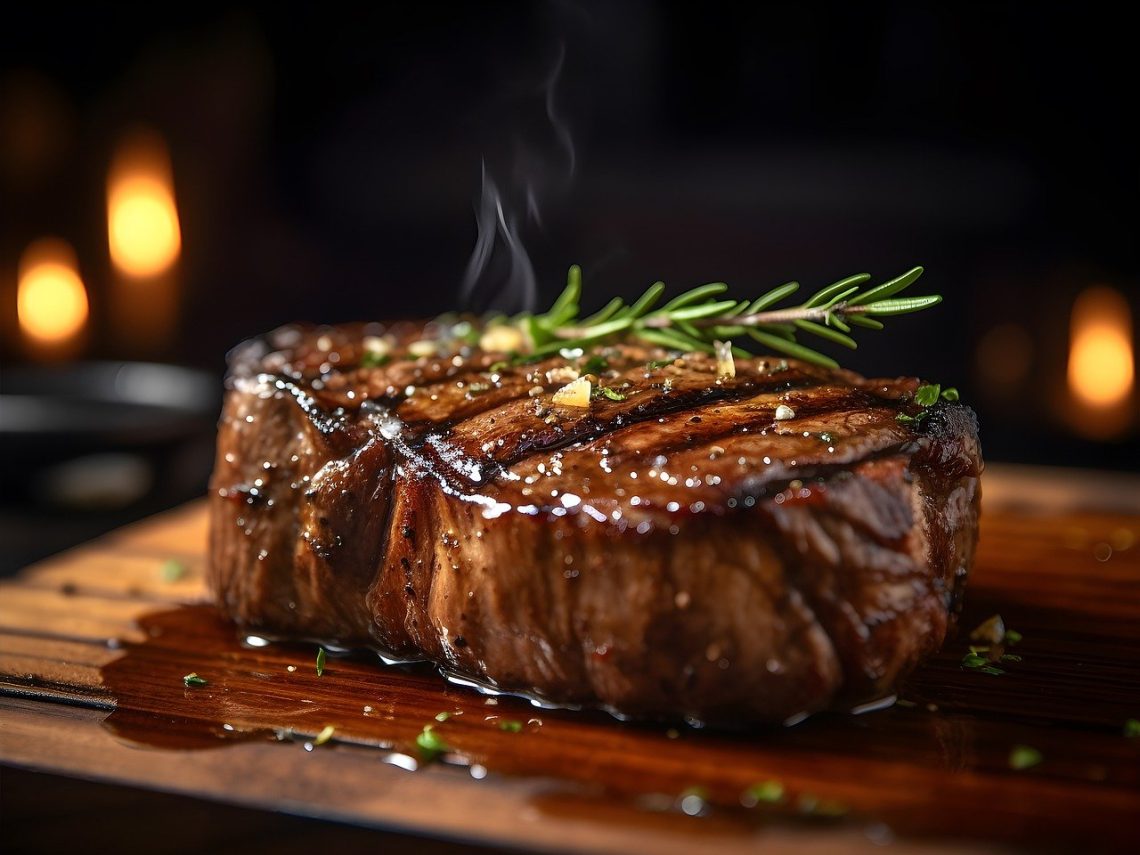Make Meat Great Again! Don’t Let The Globalists Pull This Off
It’s 2023, and most people are scurrying about their days making plans for the Holidays and figuring out whether to serve up a roast, a turkey or a ham. Meanwhile, over 70,000 clowns are toasting champagne at their 5 star hotels in Dubai while thinking they can tell people whether or not a roast, a turkey, or a ham is allowed. While flying around in their private jets, they giggle as they cook up their conspiracy theory on “climate change” to convince people to eat less meat. While they’re dancing with politicians and coercing nations to set new policies and regulations to harm the productivity of farmers and ranchers – our food source – people should be supporting them and stand together in defiance of this nonsense.
The funny thing is, while these clowns conspire and celebrate their narrative to save the planet, in part by the absurdity of reducing meat consumption, many of these same clowns are supporters of Merck and were pushing for a vote at Codex to inject cattle, pigs, and poultry with Merck’s toxic steroid-like drug zilpaterol hydrochloride to produce more muscle and less fat. This of course brings a fortune to Merck, while benefiting the bottom line for ranchers who are ok with poisoning their livestock and humans. How’s that for an oxymoron? That’s right, on November 28th, while the clowns sipped champagne on their private jets headed to the COP28 in Dubai to “save the world from climate change” and instruct nations to reduce meat consumption, their counterparts were at FAO headquarters in Rome, Italy, voting to approve this poison.
So the question is – do they want to reduce meat consumption or do they want to muscle up the meat and make it more desirable to eat so people devour toxins? Perhaps it’s both. Who can keep track anymore? The cocktails are endless, from GMOs to hormones, antibiotics, DNA and mRNA, or growing meat in a petri dish or 3D printing it. These globalists want to make it so inedible, no one will want to consume meat.
According to Scott Tips, President of The National Health Federation, who attends these Codex meetings to fight for the safety of consumers, this is all about money, and by adopting the Codex standard zilpaterol can “flood the world markets unobstructed.” This would allow Merck to force all of the countries who voted against it to open their markets to zilpaterol-tainted meat as well. Most of the western hemisphere has already been using zilpaterol despite the fact that there has never been a risk assessment done, it’s banned from use in horses because it’s not safe, and Merck actually withdrew it from the market in 2015 before working its way back in. At that time, under Merck’s brand name “Zilmax,” even Cargill and Tyson suspended their purchases of Zilmax-fed cattle in North America.
The many-years-long battle against the toxic vet drug came to an end when the Commission voted 88-49 with 11 abstentions to approve zilpaterol MRLs (maximum residue levels). Scott Tips reported that those “speaking against the standard were the European Union, Switzerland, Norway, Russia, Kazakhstan, Turkey, China, Thailand, Saudi Arabia, Qatar, Iran, Iraq, UAE, Algeria, Belarus, Syria, Tunisia, North Macedonia, and Cameroon. Those pushing the standard were the United States, Canada, New Zealand, many African states, and every single one of the Western-hemisphere countries. The UK remained strangely aloof, as if wishing to avoid offending anyone.”
Back in the U.S., Rep. Thomas Massie (R-KY) has been trying to get the PRIME Act passed for nearly 6 years, but feels he is beginning to make headway now. If passed, the PRIME Act will make it much easier for local farms to compete with the handful of big meat companies, by allowing safe, local processing options rather than a farmer having to travel for hours to a USDA-inspected processing facility.
According to Rep. Massie, “Current law exempts custom slaughter of animals from federal inspection regulations, but only if the meat is slaughtered for personal, household, guest, and employee use (21 U.S.C. § 623(a)). This means that in order to sell individual cuts of locally raised meats to consumers, farmers and ranchers must first send their animals to one of a limited number of USDA-inspected slaughterhouses. These USDA-inspected slaughterhouses are sometimes hundreds of miles away from farms and ranches, adding substantial transportation costs and increasing the chances of locally raised meat co-mingling with industrially-produced meat. The PRIME Act would expand the current custom exemption and allow small farms, ranches, and slaughterhouses to thrive.”
While the battle on meat continues, it’s important for everyone to do their due diligence when it comes to shopping for and purchasing meat. According to the USDA, in March they released a proposed rule with new regulatory requirements on those voluntary “Product of USA” labels, whereby the claim can only be used on meat, poultry and egg products if they are derived from animals that are born, raised, slaughtered and processed in the USA. So pay attention to the labels – on all food for that matter. There are some small farms that offer co-ops whereby several people can go in on the ownership of cattle and split the beef. There are also a handful of companies who ship bundles of beef. In either case, it’s always important to confirm how the cattle are raised and processed, and if they are given zilpaterol, antibiotics, hormones, or mRNA. Always support your local farmers, whether it be for meat, vegetables, fruit, raw milk, or other items. They are quite literally our key to survival, unless of course you are able to grow enough food and raise livestock to support your entire family on an annual basis. They deserve our support and respect.
Corey’s Digs has done extensive research on an incredible, fully vertically integrated large ranching operation in the U.S. who controls their entire supply chain. It’s quite impressive. The cattle are all pasture raised on over 290,000 combined acres by their own mothers. This is a premium lineage of all Prime and High Choice, with the processing facility being right on the ranch, and the beef is aged for 21 days before shipping. Never ever zilpaterol, antibiotics, hormones, mRNA, or vaccines. They ship a variety of bundles monthly or every other month, along with individual added cuts, straight from the ranch to a customer’s home. The biggest difference is the taste – it’s amazing how delicious Prime beef is without all those toxins. The beef is exclusive to members through Shopping Club Freedom, which boasts hundreds of non toxic products that everyone uses in their daily lives, all of which are patented and produced by this same company right here in the U.S. It’s one heck of a solution to ensure access to healthy products and beef while sticking it to the globalists who want to rule everyone’s life, which is why Corey’s Digs has partnered with them and has been shopping there for over two years now.
No one should let these madmen make choices for them or their families. Everyone should support U.S. farmers and ranchers, get behind Rep. Massie’s PRIME Act, and don’t buy the poison these globalists are selling.
MAKE MEAT GREAT AGAIN!


Subscribe to Corey’s Digs so you don’t miss a Dig!











6 Comments
ellie
Make Meat Great Again! Oh yeh! YAY Corey! Thank YOU for this informative article! I’ve been vegan and vegetarian, and my health tanked every time! The Weston Price Foundation is a great organization to tap into for more benefits of eating clean animal protein. Also, Joel Salatin’s; The Marvelous Pigness of Pigs is an excellent read! https://www.amazon.com/Marvelous-Pigness-Pigs-Respecting-Creation/dp/1455536989
Corey Lynn
Yes, Weston Price Foundation and Joel Salatin are both excellent resources! 🙂
Skip
Off topic but see the real immunities in action here.
https://needtoknow.news/2023/12/david-martins-speech-exposing-covid-19-crimes/
His proposal to reject the WHO entirely is spot on and anything else is going to come up short. Forget the treaty crap. It is like arguing about lifeboats after the iceberg has been hit. Get off the ship now!
Dawn Slike
Good stuff here, Corey. The question in my mind is, is America so hopelessly depressed now that she no longer has the energy to read or even the hopefulness to trust meat labels?
nanomultipolar
The “alternative” (both to meat and to the globalist agenda):
nanomultipolar
By the way, just to say:
Pardon me for the off-topic 🙂